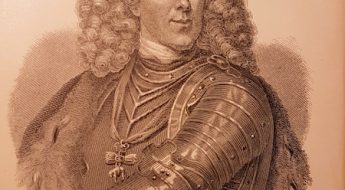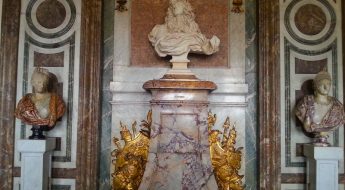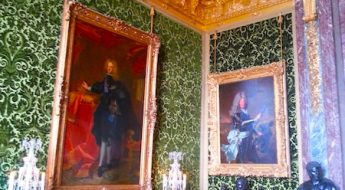It was on this day 327 years ago, on 25 October 1692, that a future queen of Spain was born.
The baby girl was Isabel Farnese, the only surviving child of Odoardo Farnese, himself the eldest son of the reigning Duke of Parma, Ranuccio II. Her mother was Dorothea Sophie, Princess Palatine. When Odoardo died, predeceasing his father, Dorothea Sophie married his younger brother, Francesco, who was the new heir to the throne. In other words, baby Isabel’s uncle was also her stepfather. When Ranuccio II died in 1694, Isabel’s uncle/stepfather and mother became the new Duke and Duchess of Parma. Since they had no children, and the youngest brother of the family, Antonio, also had only a daughter, it became accepted that Isabel would eventually inherit the duchy. To that end, she was carefully educated.
Unsurprisingly, she had many suitors. After the early death of Felipe V of Spain’s wife in 1714, Isabel was proposed as his new bride. The power behind the Spanish throne, the Princess des Ursins, backed Isabel because of reports that the young princess was easily led. Nothing could have been further from the truth. On her arrival in Spain, Isabel immediately sacked des Ursins and had her deported to France. Felipe V fell in love with Isabel at their first meeting and was soon completely dominated by her. In essence, it was Isabel who ruled Spain until Felipe’s death in 1746.
Frustratingly for Isabel, Felipe’s first wife had left 2 sons, both of whom came before her own sons in the line of succession. In compensation, Isabel fought to have her eldest son, Carlos, made Duke of Parma after the death of Duke Antonio and his only (unmarried and childless) daughter. In fact, Carlos did considerably better. After a good showing in the War of the Polish Succession (1733-1736), which was really about Italy, Carlos bagged the kingdoms of Naples and Sicily. Isabel finally managed to secure her ancestral inheritance when she manoeuvred her younger son, another Felipe, onto the throne of Parma in 1748.
Isabel lived long enough to see her childless stepson, Ferdinand VI, die in 1759, thus making Carlos of Naples and Sicily King of Spain as Carlos III. He duly abdicated his Italian thrones to his son in order to take up his new Spanish one. Isabel served as regent while waiting for him to arrive.
Isabel died, presumably satisfied by the achievement of her life’s ambitions, in 1766.


















Leave a Comment